
University ranking bodies keep expanding and growing year after year with more universities submitting their data to be ranked. This year’s QS World Rankings includes 1,500 universities from 112 territories. The 21st edition of the Quacquarelli Symonds (QS) World University Rankings includes eight more countries than the previous year and holds plenty of changes across the charts.
The Top 10
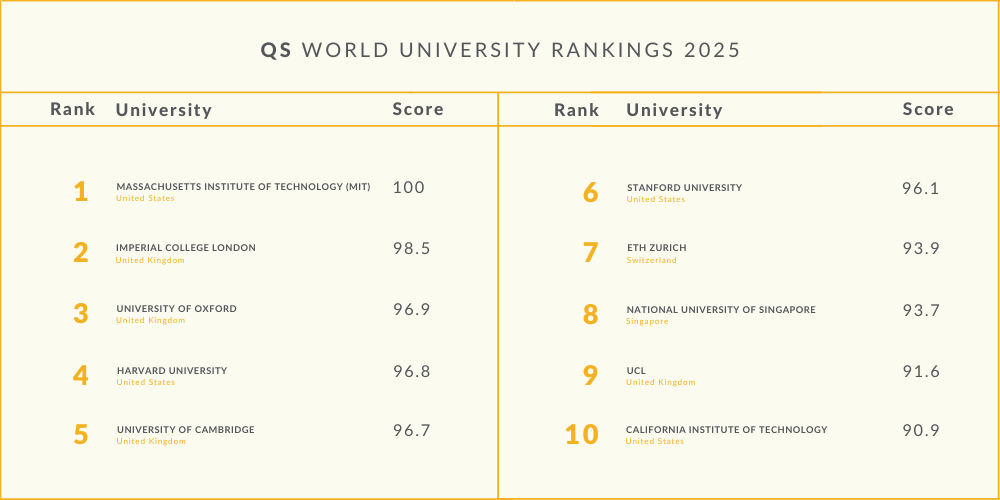
While this year’s top 10 has witnessed a few changes, Massachusetts Institute of Technology (MIT) still ranks number one for the 13th consecutive year. One of the most impressive improvements across the top 10 charts, Imperial College London moves up four spots to second place, up from sixth last year. In contrast, University of Oxford and Harvard University both maintain their ranks in third and fourth place respectively. Stanford University occupies fifth place this year, up from sixth last year. Unchanged in rank, ETH Zurich, the National University of Singapore (NUS), and University College London have preserved their spots in seventh, eighth, and ninth place respectively. California Institute of Technology (Caltech) replaces University of California, Berkeley (UCB) in 10th spot this year, rising five ranks from 15th place last year and earning the highest riser among the top 10 for this year.
Overall, four universities from the United States, four others from the United Kingdom, one from Switzerland, and another from Singapore have populated the top 10 charts for this year.
QS Methodology for 2025 Remains Unchanged
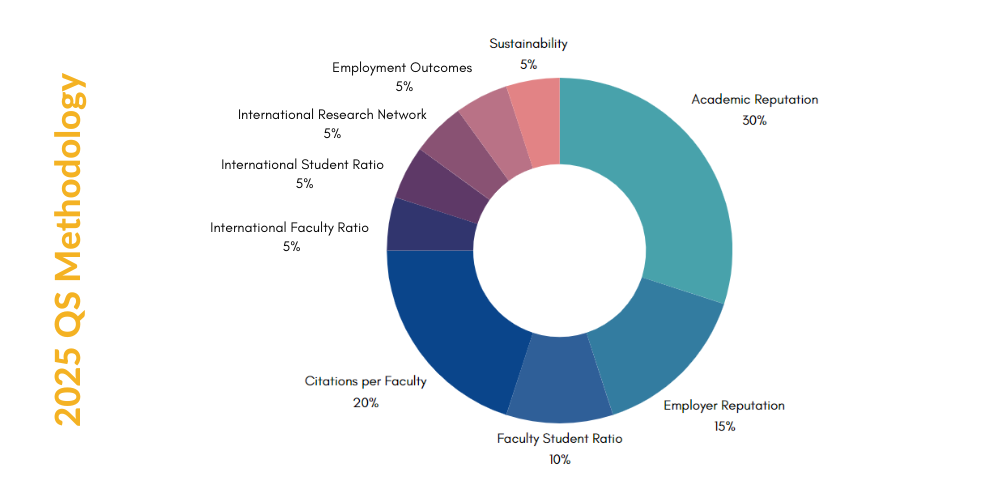
QS had introduced three new metrics to its methodology last year: International Research Network, Employment Outcomes, and Sustainability – each of these make up 5% of the total score for any university being ranked. It’s worth noting that QS is the only ranking to include Employability and Sustainability into its ranking methodology, setting it apart as a comprehensive assessment tool for evaluating higher education institutions worldwide.
The Most Represented Countries
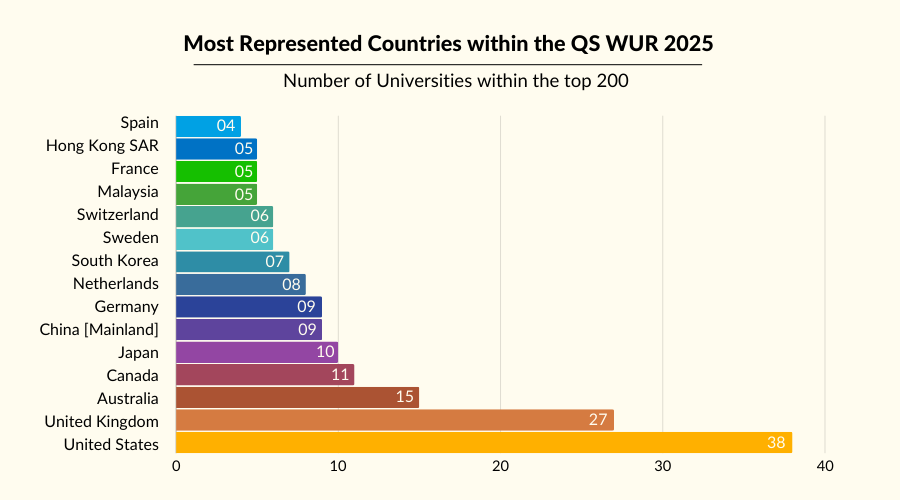
The 2025 QS World University Rankings provides a glimpse into the overall landscape of higher education across countries and continents. Once again, the United States emerges as a key player, with a tally of 38 universities on the charts, down from 42 last year. The United Kingdom follows as a close second retaining 27 institutions ranked, both countries well represented not only within the top 200, but also within the top 10. Australia similarly secures a substantial presence with 15 universities on the list, upholding the same number from the previous year. Canada, on the other hand, secured two more universities within the top 200 this year. Japan, China, and Germany each gained one extra university this year. Even though France lost one university, down from six last year, the Netherlands, South Korea, Sweden, Switzerland, Malaysia, Hong Kong SAR, and Spain have all preserved their numbers within the top 200.
QS has also reported on the countries with the fastest ranking growth and upward moves on the chart, listing China, India, the United Kingdom, Germany, and Australia (in decreasing order) as the fastest risers, with institutional ranks improving rapidly across these countries. Furthermore, it has highlighted the Canadian universities’ sustainability achievements; Saudi Arabia’s and the United Kingdom’s ability to attract international students, and Australia’s prominence within the “International Research” indicator across the Asia-Pacific region.
Top 10 According to the Sustainability Metric
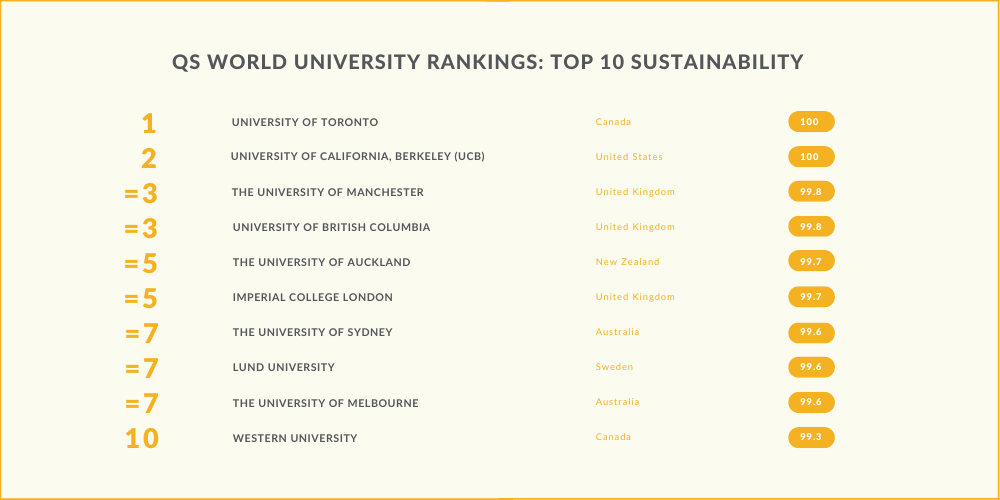
Universities are the incubators of tomorrow’s leaders and as such they have a moral imperative to awaken environmental consciousness in their students. By recognising and acknowledging their efforts towards sustainability, various ranking bodies have been able to highlight the holistic role of universities, not only in terms of academic excellence, but also in raising a generation of ecologically responsible citizens.
Both the University of Toronto and the University of California Berkeley (UCB) obtained a full score, sharing first place. The University of Manchester was a close second with a score of 99.8, an astounding advancement from 75th spot and a score of 92.3 just one year ago. The University of British Columbia maintained it’s rank in third place, while the University of Auckland jumped up four spots to fifth this year. Another university that was not on the top 10 chart last year is Imperial College London, up from 61st place last year and sharing fifth spot with University of Auckland. Meanwhile, the University of Sydney kept its rank in seventh place. Also in seventh place, Lund University from Sweden rose from 14th place while the University of Melbourne made an appearance in the same spot after having ranked 92nd last year within the same chart. Finally, Western University dropped two places to 10th spot concluding the top 10 sustainability table.
Within the Arab World
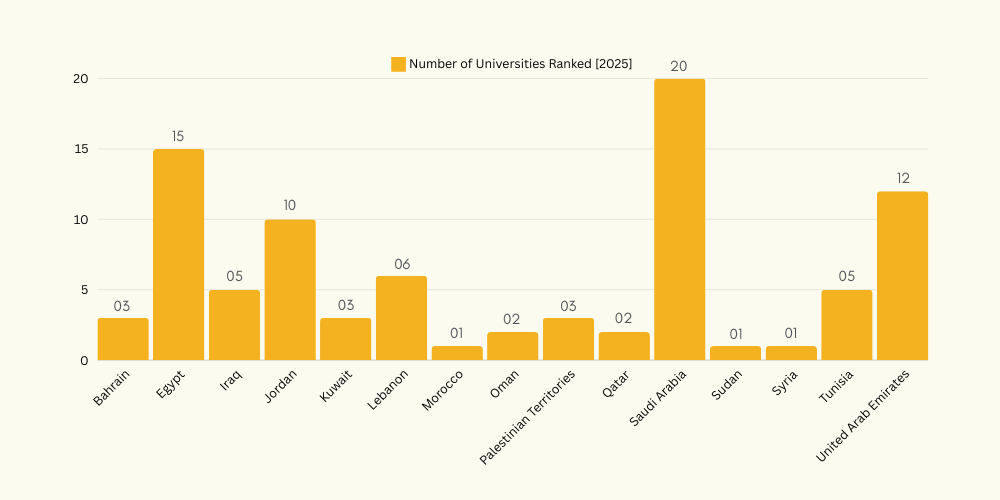
Eighty-nine Arab universities were ranked on this year’s QS charts, compared to 84 last year. Saudi Arabia maintains its status as the fastest growing higher education system within the Arab world, adding four more universities to the chart and rounding up its presence to 20 ranked universities. In addition to that, it has secured three universities within the top 200; those being King Fahd University of Petroleum and Minerals (KFUPM) in 101st spot, King Abdulaziz University (KAU) in 149th spot, and King Saud University in the 200th rank.
While the number of ranked universities from Bahrain, Egypt, Iraq, Kuwait, Morocco, the Palestinian Territories, Qatar, and Syria remain unchanged, other Arab nations have witnessed some updates. For instance, Jordan gained an extra university rounding up the number of its institutions to 10; Lebanon lost two, bringing the total number to six, down from eight last year. Oman gained one, Sudan lost one, and Tunisia also gained another institution on the list. Finally, the United Arab Emirates similarly earned another spot, bringing the total number of its ranked institutions to 12, with a new entrant making an impressive debut on the chart; American University of Ras Al Khaimah.
Let’s look at the Arab Universities that made it into the top 500 this year:
– [101] King Fahd University of Petroleum & Minerals – Saudi Arabia
– [122] Qatar University – Qatar
– [149] Kind Abdul Aziz University (KAU) – Saudi Arabia
– [183] Hamad bin Khalifa University – Qatar
– [250] American University of Beirut (AUB) – Lebanon
– [261] United Arab Emirates University – UAE
– [332] American University of Sharjah – UAE
– [350] Cairo University – Egypt
– [362] Sultan Qaboos University – Oman
– [368] University of Jordan – Jordan
– [410] The American University in Cairo – Egypt
– [434] University of Sharjah – UAE
– [477] Ajman University – UAE
– [485] American University of Ras Al Khaimah – UAE
To check for any corrections or edits of this edition of the Quacquarelli Symonds World University Rankings, click here.


